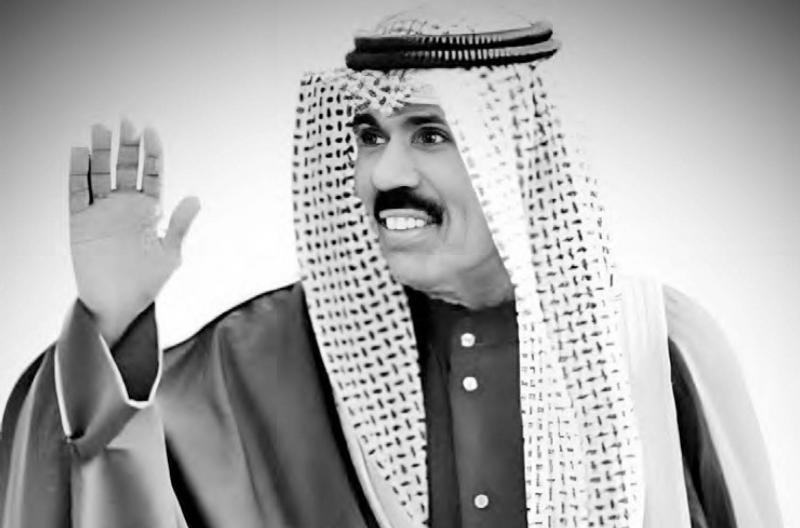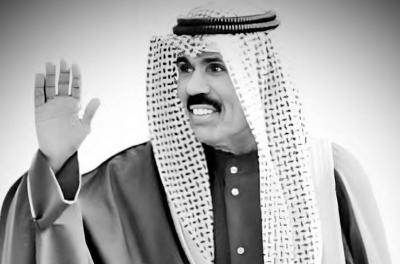The Emir of Kuwait, Sheikh Nawaf Al-Ahmad Al-Jaber Al-Sabah, who passed away yesterday morning, left a significant mark on the political life of the State of Kuwait, despite the short time he spent as Emir due to health conditions that led him to delegate some constitutional duties to his brother and Crown Prince, Sheikh Mishaal Al-Ahmad, on November 16, 2021, a year after he assumed power on September 29, 2020. The Kuwaiti Cabinet had called Sheikh Nawaf Al-Ahmad to become the Emir of the country following the late Emir Sheikh Sabah Al-Ahmad on September 29, 2020, as he was the Crown Prince and according to the provisions of the Kuwaiti constitution and Article 4 of Law No. (4) of 1964 regarding the rules of succession to the emirate. He was known for his wisdom, integrity, dedication, and commitment to everything that promotes the welfare, interest, security, and prosperity of Kuwait.
During the short time he spent as Emir, local issues took center stage in the late Emir's concerns, especially during the first year of his reign, due to his deep interest in details related to citizens' affairs. This was also compounded by the emergency conditions resulting from the spread of the "COVID-19" virus, which necessitated directing the relevant authorities to make concerted efforts to mitigate its impacts on the country.
On a personal level, Sheikh Nawaf Al-Ahmad was particularly keen on promoting virtues and values and believed in the importance of unity and solidarity among Kuwaitis. His ascension as the 16th Emir of Kuwait came after nearly 58 years of political work during which he held several positions, starting as the Governor of Hawalli, then Minister of Interior, followed by Minister of Defense, Minister of Social Affairs and Labor, Deputy President of the National Guard, and finally as Deputy Prime Minister and Minister of Interior.
Over a 14-year period, during his time as Crown Prince, Emir Sheikh Nawaf Al-Ahmad was closely associated with his brother, the late Emir Sheikh Sabah Al-Ahmad Al-Jaber Al-Sabah, as per the Amiri decree issued by the late Emir on February 7, 2006, endorsing Sheikh Nawaf for the Crown Prince position.
The late Emir Sheikh Nawaf Al-Ahmad was born on June 25, 1937, in Farij Al-Shuyukh (now the site of Al-Muthana Complex) in Kuwait City. He was the sixth son of the 10th ruler of Kuwait, Sheikh Ahmad Al-Jaber Al-Mubarak Al-Sabah (who ruled from 1921 to 1950), and the half-brother of two other Kuwaiti rulers: Sheikh Jaber Al-Ahmad (the 13th ruler between 1977 and 2006), and Sheikh Sabah Al-Ahmad (the 15th ruler between 2006 and 2020).
He lived and grew up in the ruling family, Al-Diwan Al-Amiri, and received his education in various schools in Kuwait, including Hamada, Eastern, and Al-Nuqra, followed by Al-Sharqiya and Al-Mubarakiyah schools. He continued his studies in various locations across Kuwait.
His political career began after Kuwait's independence in the early 1960s when the late Sheikh Abdullah Al-Salem appointed him the Governor of Hawalli on February 21, 1961, a position he held for 16 years until March 19, 1978, when he was appointed Minister of Interior for ten years. Sheikh Nawaf Al-Ahmad is considered the true founder of the Ministry of Interior in Kuwait in its modern form, overseeing various departments. He held the ministerial role over two periods: the first from March 1978 to January 1988, and the second from 2003 to February 2006. During his tenure as Minister of Interior, he modernized this security institution to face the security challenges confronting the country.
Sheikh Nawaf Al-Ahmad took on the role of Minister of Defense in 1988 until 1991, during which time the country faced the catastrophe of the Iraqi invasion (August 2, 1990 - February 28, 1991). Following the formation of the first government after Kuwait's liberation, Sheikh Nawaf assumed the Ministry of Social Affairs and Labor in April 1991, then became the Deputy President of the National Guard in 1994, before returning to the Ministry of Interior in 2003 until he became Crown Prince in 2006.
After Sheikh Sabah Al-Ahmad assumed power on January 29, 2006, succeeding Sheikh Saad Al-Abdullah Al-Salem Al-Sabah, who abdicated due to health reasons, Sheikh Sabah Al-Ahmad issued an Amiri decree endorsing Sheikh Nawaf Al-Ahmad as Crown Prince on February 7, 2006, and he was sworn in by the National Assembly as Crown Prince on February 20, 2006.
Sheikh Nawaf Al-Ahmad was married to Sherifa Suleiman Al-Jassem, and they had children: Sheikha, Faisal, Ahmad, Abdullah, and Salem. He was characterized by his strong commitment to promoting values and principles and believed in the importance of unity among the people of Kuwait.
In his first speech after taking the oath of office before the National Assembly as Emir on September 30, 2020, Sheikh Nawaf Al-Ahmad called on his fellow citizens to unite in facing the challenges the country faces, pledging to work for the prosperity, stability, and security of the state. He noted that "Kuwait has faced serious challenges and harsh tribulations throughout its long history, which we have succeeded in overcoming through cooperation and solidarity, steering our ship to safety."
He added, "Our dear homeland faces delicate conditions and serious challenges today that cannot be surmounted and escaped from their consequences except through unity and combined efforts of all of us, working sincerely for the welfare and elevation of Kuwait and its loyal people." He affirmed, "We express our pride in our Constitution and our democratic approach, and we take pride in our Kuwait as a state of law and institutions, emphasizing our commitment to embodying the spirit of unity that defines our Kuwaiti community, and our adherence to our established principles."
In his address to citizens on August 23, 2020, which focused on pressing issues in the country, he tackled the issue of corruption, revealing investigations that implicated some members of the ruling family in corruption cases. In his speech, Sheikh Nawaf Al-Ahmad lifted the veil on family members proven to be involved in corruption.
He stated, "Fighting corruption is not an option but a religious duty, constitutional obligation, moral responsibility, and a national project shared by all." He further emphasized, "For anyone questioning the accountability of members of the ruling family, we confirm that they are part of the Kuwaiti people, and the same laws apply to them. Those who err must take responsibility for their mistakes; no one is above the law," adding, "There is no one above the law, and there is no protection for a corrupt individual, regardless of their name, title, or status." He called on "brothers in the government and National Assembly to adopt effective measures and legislation to deter corrupt individuals and eradicate all forms of corruption and its causes."




